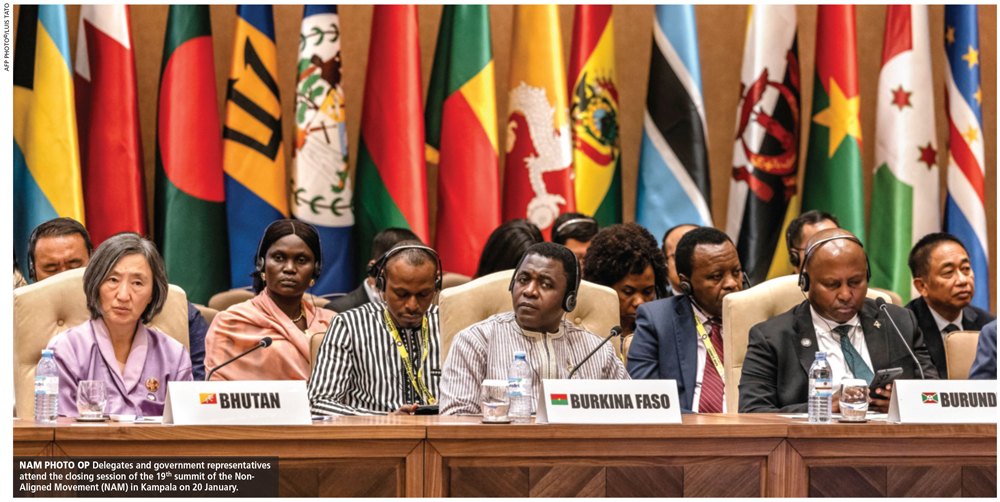NAM SUMMIT

THE RISE OF THE NON-ALIGNED MOVEMENT
Saro Thiruppathy elaborates on what the Non-Aligned Movement (NAM) entails and critical issues agreed upon at the 19th summit in Kampala
The 19th summit of the Non-Aligned Movement (NAM) with a membership of 120 states took place in Uganda’s capital Kampala from 15 to 20 January.
And the presidency of NAM, which changes every three years, was handed over to Uganda by Azerbaijan at the summit.
Sri Lanka held the NAM presidency from 1976 to 1979 under former presidents William Gopallawa (two years) and J. R. Jayewardene (one year). Foreign Minister of Uganda General Abubaker Jeje Odongo declared open the summit and noted in his welcome address that “today, we are faced with many challenges globally including terrorism, climate change, the debt burden and famine among others, and it is therefore benefitting that this year’s summit will be held under the theme ‘Deepening Cooperation for Shared Global Affluence.’”
“NAM continues to hold significance as an organisation and in light of the intricate global landscape, the continued relevance of the 10 point Bandung Principles remains evident in the present era,” Odongo added.
HISTORY OF NAM The Bandung Principles of 1955 are encapsulated in the goals of the Non-Aligned Movement: to protect the nascent freedom of the newborn independent countries of Asia and Africa from colonial domination; oppose colonialism, imperialism and racial discrimination; advocate sovereign equality of all states; and encourage friendly relations among countries.
The first reference to nonalignment was made in 1950 at the UN by India and Yugoslavia when they refused to align themselves with any of the alliances that were involved in the Korean War.
NAM was created by the then Yugoslavian President Josip Broz Tito, Indian Prime Minister Jawaharlal Nehru, Egyptian President Gamal Abdel Nasser, Ghanaian President Kwame Nkrumah and Indonesian President Koesno Sukarno.
The movement’s first summit was held in 1961 with Tito as its chair in Belgrade with the aim of advancing the interests of developing countries during the Cold War, which was in full swing at the time.
CURRENT CONTEXT In keeping with the Bandung Principles, much of the discussion in Kampala focussed on the ongoing tragedy in the Gaza Strip. At the time of the summit, health authorities stated that more than 24,000 Palestinians had been killed by Israeli forces in response to the 7 October attack by Hamas, which resulted in an estimated 1,200 deaths.
The NAM declaration states that it “strongly condemns the illegal Israeli military aggression on the Gaza Strip, the indiscriminate attacks against Palestinian civilians and civilian objects, the forced displacement of the Palestinian population, and further calls for an immediate and durable humanitarian ceasefire.”
The grouping of nations also called for an immediate end to the Israeli occupation of Palestinian territories so that a two state solution based on the borders that existed before 1967 could be achieved along with an independent and sovereign Palestinian State with East Jerusalem as its capital city.
And the summit strongly supported the admission of Palestine as a member state to the UN so that it could participate actively in the international community.
The Kampala Declaration also condemned “all measures taken by Israel, the occupying power, to alter the legal, physical and demographic status of the occupied Syrian Golan.” And it demanded “once again, that Israel should abide by the relevant UNSC Resolutions and fully withdraw from the Syrian Golan to the borders of 4 June 1967.”
FUTURE OF NAM South African President Cyril Ramaphosa noted that the war in Gaza showed the inadequacy of the United Nations, and specifically the role of the UN Security Council where the US had vetoed several resolutions that were critical of Israel’s actions in Gaza.
He said: “We should establish a system of global governance that is fair and equitable, and has the capacity to respond to the needs of all persons in situations of threat and harm.”
Referring to the current global challenges, Sri Lanka’s President Ranil Wickremesinghe noted the ongoing humanitarian crisis in Gaza, a shift in the post-Cold War order and emerging multipolar dynamics. Wickremesinghe added that Sri Lanka proposes that the State of Palestine be established within five years and no longer.
“Our membership today is no longer a grouping of weak states. We must recognise that as a result of the rapid progress and economic advancement of some Asian, African and Latin American states, a majority of the 10 leading economies of 2050 will belong to this movement. We see among us rising aspirants for leadership status in global affairs, and they must be prepared to give leadership,” he asserted.
This was in regard to the revitalised role of the Non-Aligned Movement.
Wickremesinghe concluded: “Let us transform ourselves from this loose movement to become a dynamic bloc of the Global South and its friends. Let us establish an effective permanent operational structure, which is equipped to address the contemporary challenges facing the Global South. Our future lies in our hands. We can make it or break it. Let us make it work.”






Leave a comment